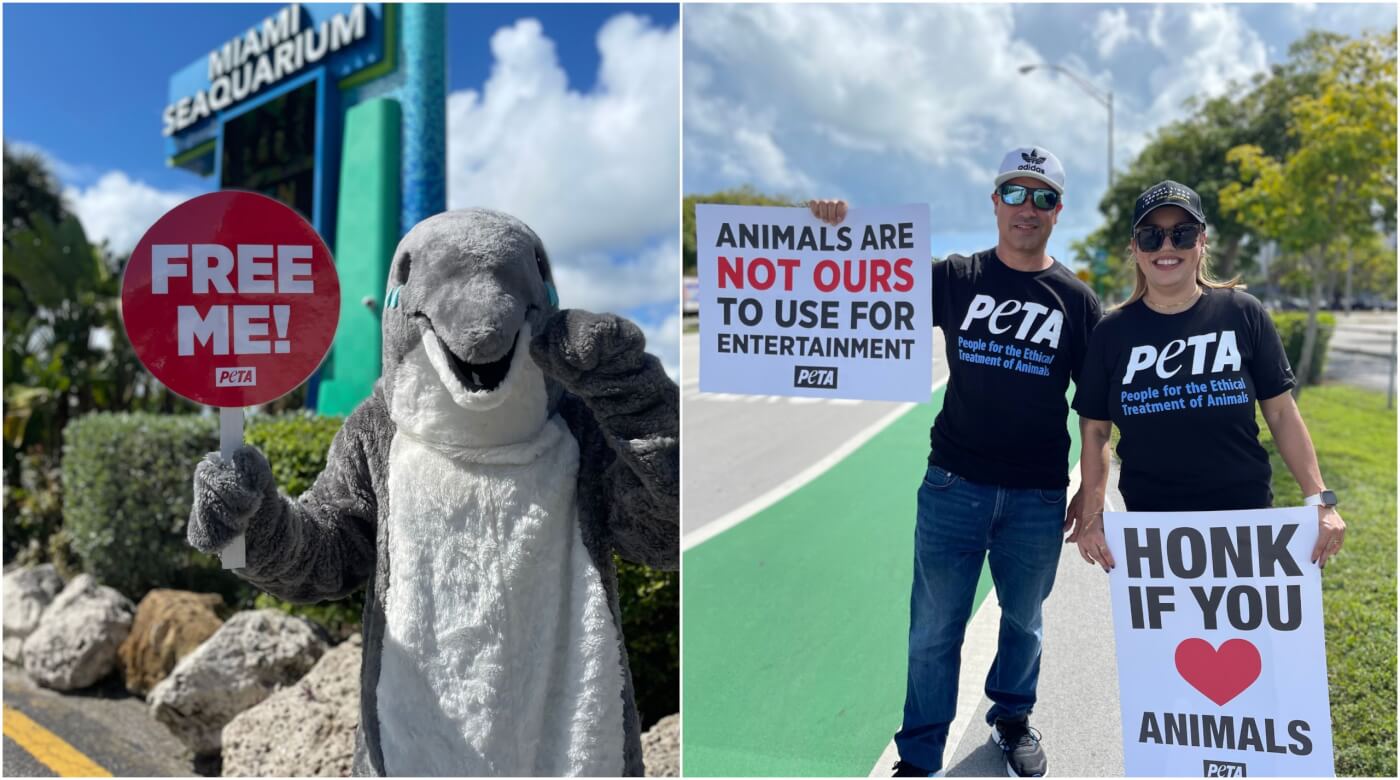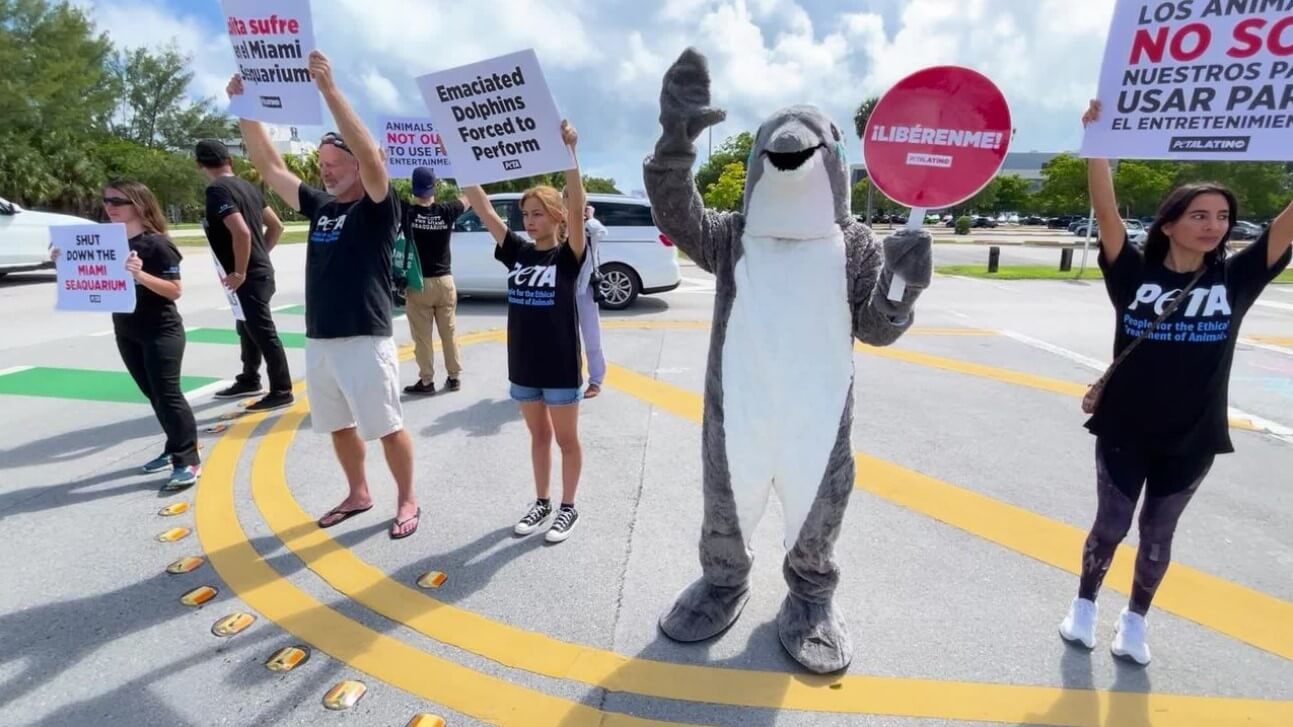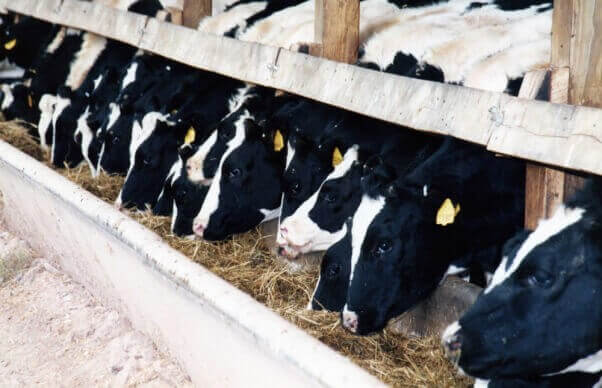Starting Monday, PETA will bring its eye-opening exhibit “Without Consent,” which explores the troubled history of experiments on animals, to Harvard University—home to experimenter Margaret Livingstone’s terrifying maternal and sensory deprivation tests on monkeys.
To mark the unveiling, a pair of PETA “grim reapers” will gather at Harvard Square wearing masks depicting Livingstone’s face and holding scythes imprinted with the message “Livingstone Kills Monkeys.”
The opening at Harvard comes after the traveling exhibit was vandalized earlier this month at the University of Massachusetts–Amherst—an act that only deepened PETA’s commitment to shedding light on the horrors of animal testing.
When: Monday, October 30, 12 noon
Where: Near Harvard Square, 27 Brattle St., Cambridge

Visitors view PETA’s “Without Consent” exhibit. Photo: PETA
Modeled after the Vietnam Veterans Memorial, “Without Consent” will be on display locally for 10 days as part of a national tour. It features 28 panels with descriptions and photographs of nearly 200 animal experiments conducted at U.S. institutions from the 1920s through today. Watch the trailer here. An interactive virtual exhibit is also available here.
“‘Without Consent’ tells the true stories of animals harmed and killed in experiments that they did not and could not consent to,” says PETA Senior Vice President Kathy Guillermo. “PETA is calling on Harvard and all other institutions to embrace modern, animal-free research, because having the power to exploit other species does not give us the right to do so.”
At Harvard, Livingstone has ripped baby monkeys away from their mothers, sewn the infants’ eyes shut for up to a year, and then observed how abnormally their vision developed. In other tests, the motherless baby monkeys are reared by humans wearing welding masks so that the traumatized animals never see a monkey or human face. Then Livingstone immobilizes their heads using head posts, chin straps, and bite bars to test their facial processing abilities or surgically implants electrodes in their brains to record how their deprived brain cells respond to visual stimuli. After years of torment, she kills many of the monkeys and dissects their brains. She has conducted these types of curiosity-driven experiments for 40 years without identifying a treatment or cure for humans.
“Without Consent” also makes the point that vulnerable humans—including orphans in tuberculosis and psychological experiments, immigrant women in gynecological surgeries, soldiers in LSD and poison gas tests, and impoverished Black men in syphilis experiments—were exploited in experiments. Just as society now understands that these experiments were wrong, “Without Consent” shows that we need to let a similar moral awakening guide our conduct today by extending consideration to the 110 million animals killed every year in U.S. laboratories. These animals are individuals who feel pain and fear, yet they’re robbed of their babies, force-fed chemicals, and sickened with diseases, among other atrocities.
Following its debut in 2021, “Without Consent” has traveled to 28 cities and has shared information about the horrors of experimentation with nearly 15,000 visitors. As neuroscientist and Jeopardy! host Mayim Bialik describes it, “‘Without Consent,’ PETA’s new traveling exhibit, is a must-see. … Check it out in a city near you and do your part to help create a better future for all!”
After viewing “Without Consent,” more than 2,500 visitors were moved to contact their legislators, urging them to oppose animal testing and endorse the Research Modernization Deal, which offers a strategy for replacing scientifically useless tests on animals with effective, human-relevant research methods.
“Without Consent” will be open to the public at 27 Brattle St. from 12 noon to 4 p.m., October 30 to November 3 and November 6 to 10.
PETA—whose motto reads, in part, that “animals are not ours to experiment on”—opposes speciesism, a human-supremacist worldview. For more information on PETA’s investigative newsgathering and reporting, please visit PETA.org, listen to The PETA Podcast, or follow the group on X (formerly Twitter), Facebook, or Instagram.
The post Harvard Sensory Deprivation Tests on Monkeys Prompt Unveiling of PETA Exhibit on Dark History of Animal Experiments appeared first on PETA.





